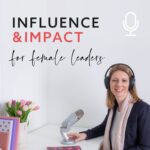Networking is an idea that makes some of us cringe. Others would love to network more but struggle to attend events due to workload and caring responsibilities. But what if networking didn’t have to be so uncomfortable and you could do it in a way that works for you?
That’s what Ellie Rich-Poole, career development coach and one of LinkedIn’s Top Voices for careers.
We cover…
-
Why networking is key to developing your career and accessing opportunities
-
How to build your network in a way that works for you
-
The power of making genuine connections rather than working the room
-
How to make yourself actually go to networking events
-
Making the most of networking opportunities
-
Creating a croissant not a bagel (you’ll have to listen to decipher that one)
This is the Influence & Impact podcast for women leaders, helping you confidently navigate the ups and downs of leadership and feel less alone on your journey as a leader.
My name’s Carla Miller, I’ve been coaching leaders for the past 15 years and I’m your leadership bestie. I’m here to remind you of the value to bring to your organisation, to help believe in yourself and to share practical tools and insights from myself and my brilliant guests that will help you succeed in your career.
Come and join over 40 women in Women Leading – my community to help you lead without overwhelm. It offers peer support calls, group coaching calls, regular menopause events and a live leadership and wellbeing workshop each month on topics including…
-
Managing an Overwhelmed Team
-
How and When to Coach Your Team
-
Reducing Drama in your Team
-
Giving Feedback Without Feeling Awkward
Find up more and sign up here.
About Ellie
Ellie Rich-Poole is a Career Development Coach. She helps leaders find their perfect role and be brilliant in it, by playing to their strengths. She goes on the journey with them as a supporter and challenger to help them get to action and get results, particularly at times of transition.
She has over 25 years’ experience in HR, Recruitment and Head-hunting. She founded her business in 2016 to inspire and support others with their career development.
She enjoys leading group sessions and speaks on a range of career topics including ’12 ways to take control of your career’, ‘Learn to Love LinkedIn’ and ‘Stop hiding, start Networking.’
She supports a range of DEI focused organisations as an Interview Coach, a Mentor and a Career Accelerator programme lead. She is the Chief Ambassador for Girls Friendly Society (GFS) a charity working with girls in the UK’s least privileged areas. She is passionate about helping individuals achieve their potential.
Ellie is a Mental Health First Aider and has lived experience of pre and postnatal anxiety.
She understands the challenges of managing a career and a family.
Ellie has lived and worked in the UK, Germany, Chile and Singapore and enjoys
supporting globally minded individuals and organisations, and making new friends.
She has studied at both Durham and Oxford University, and is an International Coaching Federation PCC level Coach. She is a Strengths Profile and Insights Discovery Practitioner. LinkedIn named her a LinkedIn ‘Top Voice’ for Careers in 2022.
Connect with Ellie on LinkedIn
